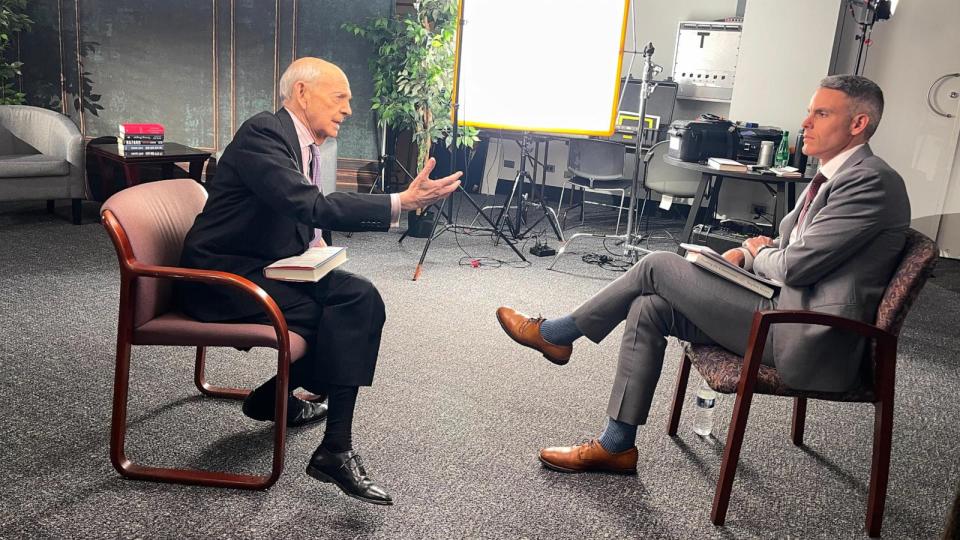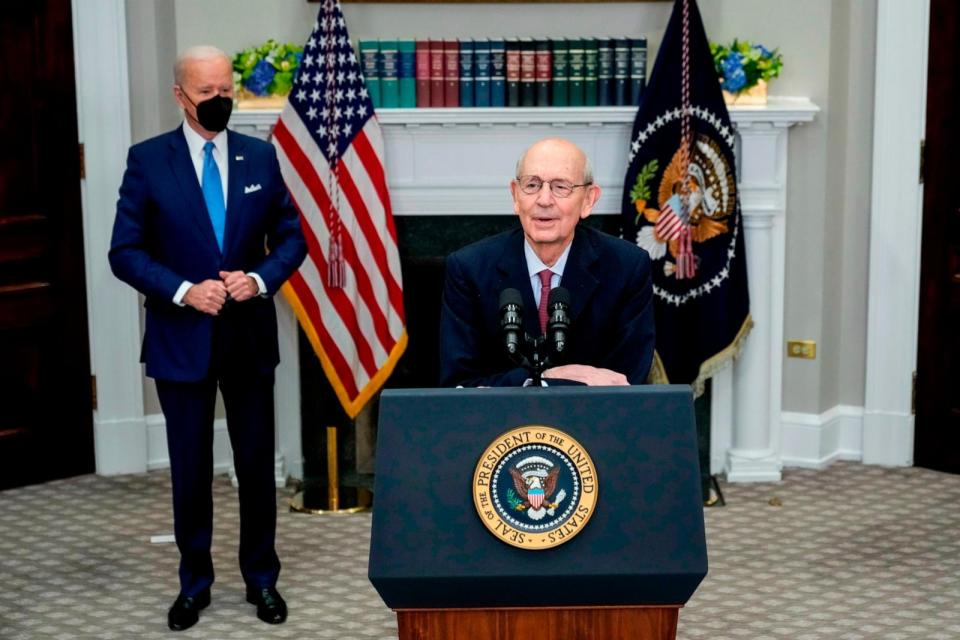Justice Stephen Breyer's blunt message to Supreme Court conservatives: 'Slow down'
- Oops!Something went wrong.Please try again later.
- Oops!Something went wrong.Please try again later.
- Oops!Something went wrong.Please try again later.
Associate Supreme Court Justice Stephen Breyer retired from the high court in 2022 but isn't finished prodding his former conservative colleagues to abandon what he sees as an aggressive tack to the right in how they interpret the law.
"Slow down. Period," Breyer, 85, said bluntly of his message to the court's majority in a wide-ranging interview with ABC News Live Prime.
"You're there a long time," he added, addressing the three justices nominated by former President Donald Trump. "It takes three years, four years, five years, maybe, before you begin to adjust."
Breyer has been on an all-out media blitz with the release of his 10th book, "Reading the Constitution: Why I Chose Pragmatism, Not Textualism," an attack on the method of judging favored by his former colleagues that now threatens generations of established legal precedent.
As the U.S. Supreme Court prepares to release major rulings in a historic series of cases this spring, Breyer pulls back the curtain on the embattled institution at a critical juncture and offers an optimistic assessment of its future. What follows is a selection of questions and answers lightly edited for brevity and clarity.
Some have described this as perhaps the most momentous Supreme Court term in a generation. They're taking on abortion, gun rights for domestic abusers, bump stocks, free speech on social media, presidential immunity. Any regrets you're not up there with them in the mix?
Well, of course, but, I mean, you reach a certain age, and that's the human condition.
What's the mood at the court right now?
I just had lunch with them. [The mood] has always been pleasant, and it's probably, as far as I know, still true.
Does the fact that you're still plugged in suggest you see a role for yourself behind the scenes?
Yeah, I think there is a role. So, how do I help? I write this book. That's how.
Parts of it seem like you're directly addressing the current court, the newest members of the court, and one of the messages I hear is 'slow down.'
That's right. And it's slow down, period. You're there a long time. It takes three years, four years, five years, maybe, before you begin to adjust.
Does this bunch of justices seem more eager than others you've studied?
No way to say. I say, Byron White said, that with every new judge, it's a new court. That's true.

You talk about the Dobbs case in the book. Justice Clarence Thomas, explicitly in his concurrence in Dobbs, called for the revisiting of some other decisions: same-sex marriage, contraception. Could those be at risk?
I tend to think, over time, they are less at risk than people worry about at the moment.
I take your optimism. But some might say you're a bit naïve.
I have had 40 years of experience.
Why are you so optimistic that members of this conservative majority will swing back the other way, come around and see the light, as you put it in the book, in the next three to four years?
I say there's reason for thinking they won't change, and reasons for thinking they will. They won't perhaps give up being a more conservative person than some other person. But they may modify a little. Why do I say that? Because I think they'll find [their approach] doesn't work.
You've chided the media publicly for using the labels 'liberal' and 'conservative' to describe the justices. And I take your point about party politics. But why aren't these competing philosophies — textualism versus pragmatism — just proxies for Republican views and Democratic views?
That's a good question. Politics in the sense in which it was used when I worked for Senator Ted Kennedy: Are you a Republican? Are you a Democrat? Are you popular? Are you unpopular? How will this decision over here play into your general image? How will it over here play into more votes? – that's not there. But there are things there you see, which depending on the case, you might say 'politics,' though I don't think that's the right word. What Paul Freund, a great professor at [constitutional] law, said that politics enters the judiciary this way: No judge decides a case based on the temperature of the day, but every judge is affected by the climate of the season.
Next month marks 70 years since Brown v Board, that unanimous Supreme Court decision which overturned 'separate but equal' and outlawed racial segregation in American schools. Do you think that the vision of Brown has been fully realized?
No. But Brown did a lot of other things, like taking Jim Crow out of the law. You can't say it's nothing; it's pretty important. But there are a lot of other things, too, before people become really equal, and there's a lot of room for improvement there.
It is still striking how much time it took after the 1954 Brown decision for states to obey – for the Little Rock, Arkansas, schools to get integrated, for example.
President Eisenhower had to send troops. He sent the 101st Airborne. It took Elizabeth Eckford and the others to walk into that school. So, it was a happy day, right? Integration took place. We have the Little Rock Nine in the school. It's going ahead. Happy day. Yeah, that would be true if I could end the story here, but I can't.
It took a president. It took public opinion. It took troops. What happens if a president doesn't agree with the court decision?
Three presidents have defied the court. Andrew Jackson and the case of the Cherokee Indians in Georgia is one example ... But do you think George Bush liked the decision of the Supreme Court, deciding in favor of people in Guantanamo and against him, the president, and the secretary of the defense and so forth? No, he didn't like it, but he said, I don't like it but I'll follow it.
You've also made the case that rule of law only survives with public confidence in the institution. Why should the public trust that members of the court are abiding by its ethics code when there's no enforcement mechanism and no independent oversight?
Because the only way you can really punish a federal judge is by impeachment. They wrote that in the Constitution.
A lot of people say the court is self-policing. How can that be?
Well, let's change the Constitution. Do you want the judges to be deciding on the basis of public opinion? Well, do you? No! Of course not. Of course not.
The headlines about some of your former colleagues have been very concerning to people. The alleged trips, book deals, things like that — accusations of misbehavior. You don't think there needs to be any independent review of that?
I didn't say that. What I said was there was only one real way of punishing the judge, and that's to impeach.
There's been a lot of talk in the past year about the political activities of justices' spouses. Does that ever become problematic, in your view?
Suppose that your wife wants to give $100 to candidate X, and you're a member of the court. Can she do it?
Can she? What does the ethics code say?
It doesn't say she can't. But it's not just what the ethics code says. I thought this was a period when women made their own decisions. I thought this was a period when they were not just doing whatever there was best for their husband.
They are independent people.
I thought so. I thought so.

Do you worry about political reaction to the court's decisions? And do you worry about violence?
There were instances of someone who was caught who had flown from the West Coast with weapons with the intent of attacking one of the justices.
Justice Kavanaugh.
Yes. So, of course, it's a concern, and it's a serious, serious problem. You don't want any of the disagreements among people, which are many and can be healthy, to turn into violence. Totally wrong, totally wrong, totally wrong.
Have you ever been threatened as a judge?
I don't know, because they [Supreme Court Police] take the letters.
So, you haven't ever felt in danger?
No.
Two years ago you faced a lot of pressure from liberals and Democrats to retire. There was even a van driving around the Supreme Court with a billboard saying, 'Breyer retire now.' Did you hear any of the calls to retire? And, were you concerned that if you had left in the midst of that, that it might appear that you were bowing to political pressure?
Both of those things somewhat. So, yeah.
MORE: Justice Stephen Breyer on being a justice: 'Don't let up,' and meditate
Any advice for Justice Sonia Sotomayor, who seems to be facing the same thing right now?
People can say what they want. They can say what they want. That's their decision to say whatever they want. I don't have to agree with it.
Finally, when you retired from the court, you said the country is an experiment in democracy that is still in progress — that it's the "next generation, the one after that, my grandchildren and their children, they'll determine whether the experiment still works" — and that you are optimistic. Why are you so optimistic when every day we're bombarded with reasons why this democratic experiment is on the brink?
It's not the first time. And Senator Kennedy used to say — as the country goes like this, you know, it's wavering but survives. And Churchill said the United States always does the right thing — after trying everything else. There is a lot to learn before you become too depressed.
Justice Stephen Breyer's blunt message to Supreme Court conservatives: 'Slow down' originally appeared on abcnews.go.com

